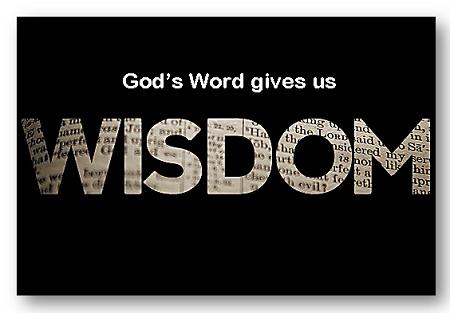The Wonder of God's Word
The Wonder of God's Word
Read Psalm 19:7-14

Psalm 19 is one of the classic texts dealing with the Word of God. Its theme is communication: God communicating to us and we to Him. Structurally, the psalm develops in three sections. In verses 1-6, God communicates through nature. This general revelation is unceasing, understandable, and universal, but unable to save since faith comes by hearing the Word of God. In verses 7-10, He communicates through His Word (special revelation) to which we respond by communicating through prayer (vv. 11-14). There is always a link between God’s speaking and our praying: that is communication. The psalm addresses God’s revelation through His works and Word, but I want to focus our attention on the Word. From Psalm 19, I want to think about what the Bible says about itself and how we ought to regard it as our prized possession.
Before we survey the section, pay attention to the parallel structure David uses in describing God’s wonderful Word. He gives a title, a characteristic and effect of the Word (vv. 7-8), and then a title and an expanded characteristic of the Word without specifying its effect (v. 9). Three broad statements sum up the wonder of Scripture: first, the attributes of the Word declare its authority; second, the ability inherent in the Word reveals its power; and third, the application demanded by the Word is personal. A brief analysis of the six titles, for God’s Word support this synopsis.
The Law⤒🔗
First, the instruction of the Lord is complete (v. 7). The word “law” is torah, the body of instruction. It is the most general word in the Old Testament to designate all of special revelation. Whether in legislation, narrative, prophecy, or poetry, God’s Word is designed to teach – to reveal what could not be otherwise known. Its characteristic is that it is perfect. It is complete, lacking nothing. This obviously does not refer to the canon, since much of the canon was yet to come from David’s perspective. But it does mean that all the issues of necessary truth had been revealed at least in seed form. But certainly for us, God’s Word is complete in every way. The canon is complete, and God has spoken to us directly in His Son, His final Word (see Heb. 1). That Jehovah is the source of this instruction elevates its importance even more. The covenant God of salvation has insured that we have what we need. His Word shows the way to eternal life as well as maps the course for daily life. Its effect is the conversion of the soul. This means that it touches every part of life. The word “convert” has the idea of restoring, revitalizing, or energizing, and the word “soul” refers to the person, the whole man. The all-comprehensive message of God’s revelation addresses the needs of the entire man. In the Scripture, we have instructions for what we need to know for life and for death.
The Testimony←⤒🔗
Second, the testimony of the Lord is trustworthy (v. 7). The word “testimony” refers to self-attestations. What we know of God is not relative theory or make-believe; God is not a figment of imagination. We know of Him what He has chosen to reveal about Himself. We must stand in wonder when we consider what God has chosen to reveal: a personal God who is the creator and sustainer of all, the redeemer of His elect, the judge of unrepentant sinners, and so much more!
His self-attestation is “sure.” This word means reliable or dependable. Whatever God says is true; it is a Word that cannot be destroyed or proven wrong. It is worthy of belief. The effect of this reliable Word is that it supplies our basic needs. The text specifically says that it makes “wise the simple.” The point is that God addresses us where we are to minister to our needs. The simpleton needs wisdom, so God’s Word gives him wisdom. By extension, the implications are far-reaching. For those who sorrow, there is comfort; for those who sin, there is rebuke and warning; for the wayward, there is direction. The point is that whatever we need, we can find answers in the Word of God.

The Statutes←⤒🔗
Third, the precepts of the Lord are right (v. 8). The word “statutes” refers to what God has revealed from the vantage point of omniscience. He knows all that is knowable, both things actual and possible. He knows all simultaneously both macroscopically as a whole and microscopically of all the parts. So what He has spoken from His divine oversight He has spoken on purpose with full knowledge of all our needs. There is not one wasted word in Scripture.
The word “right” means straight, referring to the right path to take. Without God’s Word, we would remain irretrievably lost. The waypoints to life and safety are clearly marked. As a consequence, God’s Word rejoices the heart. Rejoicing has the idea of being content or satisfied. Scripture has the power to bring satisfaction to our innermost being regardless of external circumstances. So many never find contentment, in life because they are trying to find it in all the wrong places. But because God knows exactly what we need, He has recorded in His Word what we need. God will not disappoint His people when they seek their joy and contentment in Him.
The Commandment←⤒🔗
Fourth, the commandment is clear (v. 8). This means that His Word consists of authoritative declarations, not suggestions or options. He means what He says, and it is imperative to get His point. Too often we hear what we want to hear, but discerning what He meant is crucial. His is a living Word, but it is not a floating message that changes with time or circumstance. His intention must determine our response. The word “pure” means clear, bright, and radiant. It shines light on the path, giving clear directions to follow. The Bible is not filled with hidden codes designed to conceal the divine will, but rather with revelation to communicate that will to us. Granted, some things are easier to understand than others, but there is a message for all to comprehend, whether the layman or the scholar. Significantly, this bright and shining Word enlightens the eyes (the symbol of understanding) by giving discernment and putting everything in life it is proper perspective.
The Fear←⤒🔗
Fifth, the fear of the Lord is pure (v. 8). What a title for the Bible this is! The word “fear” is a figure of speech (metonymy) designating the effect for the cause. God’s Word (the cause) produces fear (the effect). In the Scripture, God allows Himself to be known, and to know God as He reveals Himself to be produces fear. The fear of God is that awareness of God that generates awe in the heart and obedience in the walk. The format of the psalm shifts at this point.
Rather than stating characteristic and effect, it expands the characteristic. The first thought is it is clean, meaning refined or free from any defilement, impurity, or defect. Secondly, the Word endures forever; it is eternally settled in heaven and thus imperishable. This implies as well that the relevance of the Word is timeless and universal.
The Judgments←⤒🔗
Sixth, the judgments of the Lord are perfect (v. 8). The word “judgments” refers to the record of God’s decisions. The Bible is a casebook of the divine will. A casebook sets the precedence for determining the proper actions in various situations. The Bible, therefore, is to be consulted in making the decisions of life. That they are true and completely righteous describes these decisions as perfect. They conform to and declare the Lord’s absolute standards of what is right in terms of both doctrine and duty. It is imperative, then, to take heed to what He says.

The closing verses (vv. 10-14) reveal something of David’s wonder over what he possessed in the revelation he had. The conclusion that God’s Word is more desirable than gold (the symbol of wealth) or honey (the symbol of pleasure) is logically appropriate (v. 10). For us, the Bible is a common possession. Many of us possess multiple copies – even in different languages. Although it is a common possession, nothing we possess is of any greater value; it has uncommon worth.
Finally, verses 11-14 demonstrate the link between God’s Word and prayer. Prayer should always flow from the Word. In the light of God’s Word, David prayed for personal purity and pleasing behavior before the Lord. That is the pattern for us to follow. Let us stand in constant wonder that God has spoken to us and resolve to live in the light of that amazing Word. It is so easy to get used to the most wonderful things and take them for granted. May that never be our attitude about this book. We confess that the Scripture is our only rule for faith and practice; let’s live like we really believe it.

Add new comment